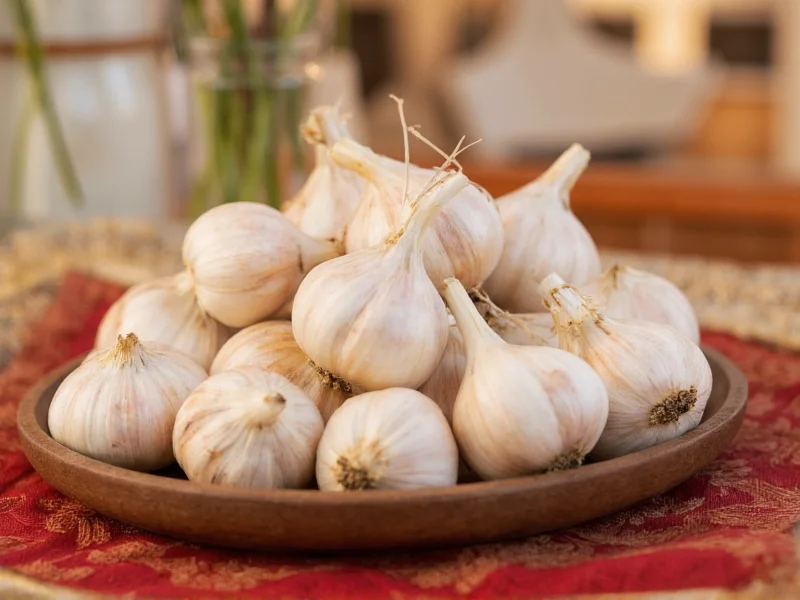Understanding what makes garlic truly fragrant requires examining both botanical characteristics and culinary science. While all garlic (Allium sativum) contains sulfur compounds responsible for its signature scent, certain varieties and preparation methods significantly amplify these aromatic qualities. The key compound allicin, formed when garlic cells are damaged, interacts with heat and other ingredients to create hundreds of additional volatile compounds that contribute to garlic's complex fragrance profile.
What Makes Garlic Fragrant: Science Behind the Aroma
Garlic's fragrance develops through enzymatic reactions. When garlic cloves are crushed or chopped, the enzyme alliinase converts alliin into allicin, which then breaks down into various sulfur-containing compounds. The specific fragrance profile depends on:
- Preparation method - Crushing creates different compounds than slicing
- Cooking temperature - Low heat preserves delicate aromas while high heat creates deeper notes
- Oil type - Different fats extract aromatic compounds at varying rates
- Acidity level - Vinegar or lemon juice alters compound formation
| Preparation Method | Aromatic Compounds Produced | Best Culinary Uses |
|---|---|---|
| Raw, finely minced | Sharp, pungent allicin compounds | Sauces, dressings, quick marinades |
| Gentle sauté (250°F/120°C) | Sweet, nutty diallyl disulfides | Base for soups, stews, creamy sauces |
| Slow-roasted (300°F/150°C) | Complex caramelized notes | Spreads, mashed potatoes, vegetable glazes |
| Fried until golden | Rich, toasted aroma compounds | Asian stir-fries, finishing oil infusions |
Fragrant Garlic Varieties Worth Seeking
Not all garlic varieties deliver equal aromatic intensity. While supermarket garlic works adequately, these specialty varieties offer superior fragrance profiles:
- Silver White - Known for balanced pungency and sweet finish, excellent for raw applications
- Porcelain types - Produce exceptionally rich aroma when roasted due to higher sugar content
- Creole varieties - Offer complex floral notes alongside traditional garlic fragrance
- Black garlic - Fermented garlic with deep umami notes and subtle sweet fragrance
Seasonality dramatically affects garlic's fragrance. Freshly harvested 'wet' garlic (available late spring to early summer) contains more moisture and delivers a milder, more nuanced aroma compared to cured garlic. For maximum fragrance impact, use garlic within 2-3 months of harvest rather than older stored bulbs.
Professional Techniques for Maximizing Garlic Fragrance
Chefs employ specific methods to extract and preserve garlic's volatile aromatic compounds. The timing of garlic addition during cooking proves critical - adding it too early causes aromatic compounds to evaporate, while adding too late prevents proper flavor development.
For optimal fragrance in oil-based preparations, heat oil to just below smoking point, then add garlic and immediately reduce heat. This 'flash infusion' technique captures volatile compounds before they degrade. When making sauces, many professional kitchens create 'garlic oil' first, removing cloves before they brown, then using the infused oil as base for other ingredients.
Preserving garlic fragrance in finished dishes requires understanding how different compounds behave. The most delicate aromatic compounds evaporate within minutes at room temperature, while more stable compounds develop over hours. For best results with fragrant garlic dishes, serve immediately or use airtight containers to capture escaping aromas.
Common Fragrant Garlic Misconceptions
Several myths persist about enhancing garlic's fragrance. Contrary to popular belief, soaking garlic in milk doesn't reduce pungency but actually alters the chemical composition of aromatic compounds. The 'more garlic equals better fragrance' approach often backfires, as excessive garlic creates overpowering bitterness that masks nuanced aromas.
Many home cooks mistakenly believe older garlic produces stronger fragrance. In reality, as garlic ages, its alliin content decreases while harsher compounds increase, resulting in less complex aroma. Properly stored garlic maintains optimal fragrance for 3-5 months under ideal conditions (60-65°F with 60-70% humidity).
Storing Fragrant Garlic Properly
Maintaining garlic's fragrance requires specific storage conditions. Refrigeration accelerates sprouting and creates unwanted moisture that degrades aromatic compounds. Instead, store garlic in a cool, dark place with good air circulation. Mesh bags or terra cotta garlic keepers work better than plastic containers which trap moisture.
For long-term storage of fragrant garlic properties, freeze whole cloves in olive oil rather than chopping first. This preserves the cellular structure, preventing premature enzymatic reactions that degrade fragrance quality. Frozen garlic-oil cubes maintain aromatic integrity for up to 6 months.
What's the difference between fragrant garlic and regular garlic?
Fragrant garlic isn't a specific variety but refers to garlic prepared or selected to maximize aromatic compounds. Regular supermarket garlic can become fragrant through proper preparation techniques, though certain varieties like Silver White and Creole types naturally produce more complex aroma profiles due to their unique sulfur compound composition.
How can I make my garlic more fragrant when cooking?
For maximum fragrance, crush garlic and let it rest for 10 minutes before cooking to allow full allicin development. Use medium-low heat with high-quality olive oil, adding garlic after other aromatics like onions. Remove garlic from heat just before it turns golden - the residual heat continues the cooking process without burning delicate aromatic compounds.
Why does my garlic lose fragrance so quickly after cooking?
Garlic's most volatile aromatic compounds begin evaporating immediately after cooking stops. To preserve fragrance, cover dishes immediately after removing from heat, or add a small amount of fresh minced garlic to finished dishes. Acidic ingredients like lemon juice or vinegar help stabilize some aromatic compounds, extending their presence in the final dish.
Which garlic variety has the strongest fragrance?
Porcelain garlic varieties typically produce the most intense fragrance when roasted due to their higher sugar content, while Silverskin types offer the strongest raw fragrance. However, 'strongest' doesn't always mean 'best' - many chefs prefer Creole varieties for their complex floral notes that provide more nuanced fragrance rather than overwhelming pungency.











 浙公网安备
33010002000092号
浙公网安备
33010002000092号 浙B2-20120091-4
浙B2-20120091-4